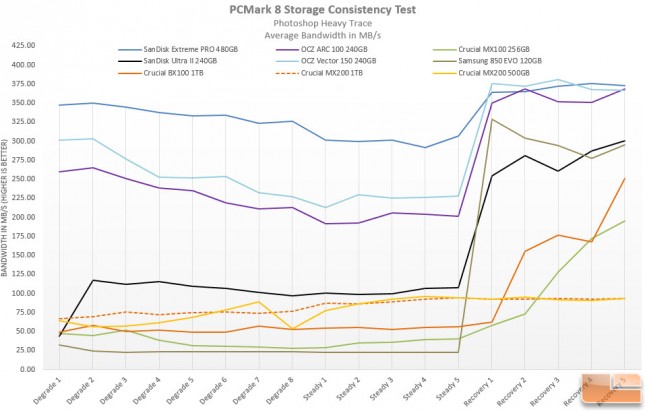Crucial MX200 and BX100 Series SSD Review
PCMark 8 Consistency Test
Something new we are starting to do is run the storage consistency test in the PCMark 8 application from Futuremark. In short, it looks at drive performance degradation as the drive becomes “dirty” and how it rebounds after given time to recover and run background routines like garbage collection and TRIM. This takes nearly a day to run through all of the iterations of test sets. Since most of our benchmarks show the drive performance in a clean state, this is a nice contrast to provide yet another view of performance. PCMark 8’s storage benchmark test contains workload traces from Adobe Photoshop, Adobe Illustrator, Adobe InDesign, Adobe After Effects, Microsoft Word, Microsoft Excel, Microsoft Power Point, World of Warcraft and Battlefield 3. The PCMark 8 Consistency test has five phases: Precondition phase
- Write the drive sequentially through up to the reported capacity with random data.
- Write it through a second time (to take care of over-provisioning).
Degradation phase
- Run writes of random size between 8*512 and 2048*512 bytes on random offsets for 10 minutes.
- Run performance test (one pass only). The result is stored in secondary results with name prefix degrade_result_X where X is a counter.
- Repeat 1 and 2 for 8 times and on each pass increase the duration of random writes by 5 minutes
Steady state phase
- Run writes of random size between 8*512 and 2048*512 bytes on random offsets for final duration achieved in degradation phase.
- Run performance test (one pass only). The result is stored in secondary results with name prefix steady_result_X where X is a counter.
- Repeat 1 and 2 for 5 times.
Recovery phase
- Idle for 5 minutes.
- Run performance test (one pass only). The result is stored in secondary result with name recovery_result_X where X is a counter.
- Repeat 1 and 2 for 5 times.
Clean up
- Write the drive sequentially through up to the reported capacity with zero data.

Benchmark Results: Unexpectedly, the BX100 drive actually performed better on this benchmark in the recovery phase of the test, similar to that of the older MX100. The MX200 drives really don’t do a very good job of recovering after running through the degraded states with recovery numbers failing to climb past 100MB/s.
